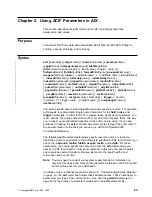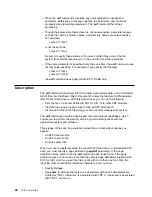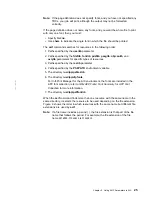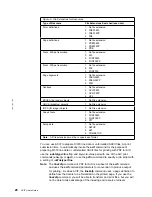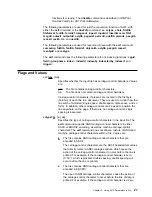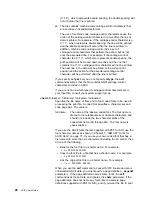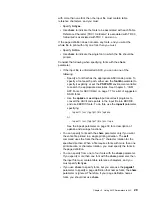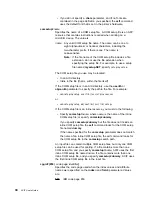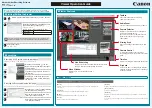
can be specified either as character data or hexadecimal
data. (If the input file is
anything other than ASCII, then
the value
must be specified as hexadecimal data.) The
attribute name is a string from 1 to 250 bytes in length.
ACIF does not perform any validity checking on the
contents of the attribute name.
field
n[,fieldn...]
Specifies one or more field
n parameters that compose
the index value. A maximum of 16 field
n parameters can
be specified. If more than one field
n parameter is
specified, ACIF concatenates them into one physical
string of data. No delimiters are used between the
concatenated fields. Because an index value has a
maximum length of 250 bytes, the total of all specified
field
n parameters for a single index cannot exceed this
length. ACIF reports an error condition and terminates
processing if this occurs.
For example, if you want to specify the following fields and indexes,
you enter:
field1='1234567'
field2=ð,1ð,2ð
field3=ð,25,2ð
index1='Patent Number',field1
index2='Employee Name',field2,field3
The example above specifies that the first index tag is made up of the
literal character string
'
1234567
'
, while the other two index tags are
made up of fields within the file records.
field1='123456'
field2='444556677'
index1='Account Number',field1
index2='Social Security Number',field2
This example specifies both index tags as literal values. The entire file
will be indexed using these two values. The resulting index object file
contains only one record in this case.
Note: The preceding examples are based on ASCII input data. If the
input data were
not ASCII, then in ACIF for AIX the literal
values used in these examples would be expressed in
hexadecimal strings. For an example using hexadecimal
strings, see “Specifying ACIF Processing Parameters for
EBCDIC Input Data” on page 58.
indexdd={INDEX |
filename}
Specifies the name or the full path name for the index object file.
When ACIF is indexing the file, it writes indexing information in the file
with this name. If you specify the file name without a path, ACIF puts
the index object file into your current directory. Values are:
INDEX
ACIF uses INDEX as the name for the index object file.
Chapter 2. Using ACIF Parameters in AIX
37
Summary of Contents for S544-5285-01
Page 1: ...IBM Print Services Facility IBM AFP Conversion and Indexing Facility User s Guide S544 5285 01...
Page 2: ......
Page 3: ...IBM Print Services Facility IBM AFP Conversion and Indexing Facility User s Guide S544 5285 01...
Page 10: ...viii ACIF User s Guide...
Page 22: ...2 ACIF User s Guide...
Page 40: ...20 ACIF User s Guide...
Page 41: ...Part 2 Using ACIF in the AIX Environment Copyright IBM Corp 1993 1999 21...
Page 42: ...22 ACIF User s Guide...
Page 72: ...52 ACIF User s Guide...
Page 96: ...76 ACIF User s Guide...
Page 99: ...Part 3 Using ACIF in the OS 390 MVS VM and VSE Environments Copyright IBM Corp 1993 1999 79...
Page 100: ...80 ACIF User s Guide...
Page 106: ...86 ACIF User s Guide...
Page 134: ...Figure 24 Example of a Customer s Phone Bill 114 ACIF User s Guide...
Page 142: ...122 ACIF User s Guide...
Page 196: ...176 ACIF User s Guide...
Page 197: ...Part 4 Appendixes Copyright IBM Corp 1993 1999 177...
Page 198: ...178 ACIF User s Guide...
Page 206: ...186 ACIF User s Guide...
Page 210: ...190 ACIF User s Guide...
Page 226: ...206 ACIF User s Guide...
Page 253: ......

